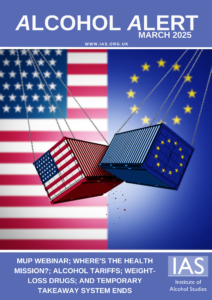In this month’s alert
How to shift the dial on alcohol policy in Europe – podcast feature
On this month’s podcast we spoke to Florence Berteletti and Anamaria Suciu, who work for the European Alcohol Policy Alliance, or Eurocare. We spoke about levels of alcohol harm in Europe, the crucial role the EU plays in shaping the alcohol policy landscape, and lessons we can learn from tobacco control about how to counter powerful lobbying by the alcohol industry.
Because even if we are David and Goliath… David wins, but we need a sling. The sling comes from our members, their collaboration and knowledge.” – Florence Berteletti
Minimum Unit Pricing: Lessons for England – IAS webinar
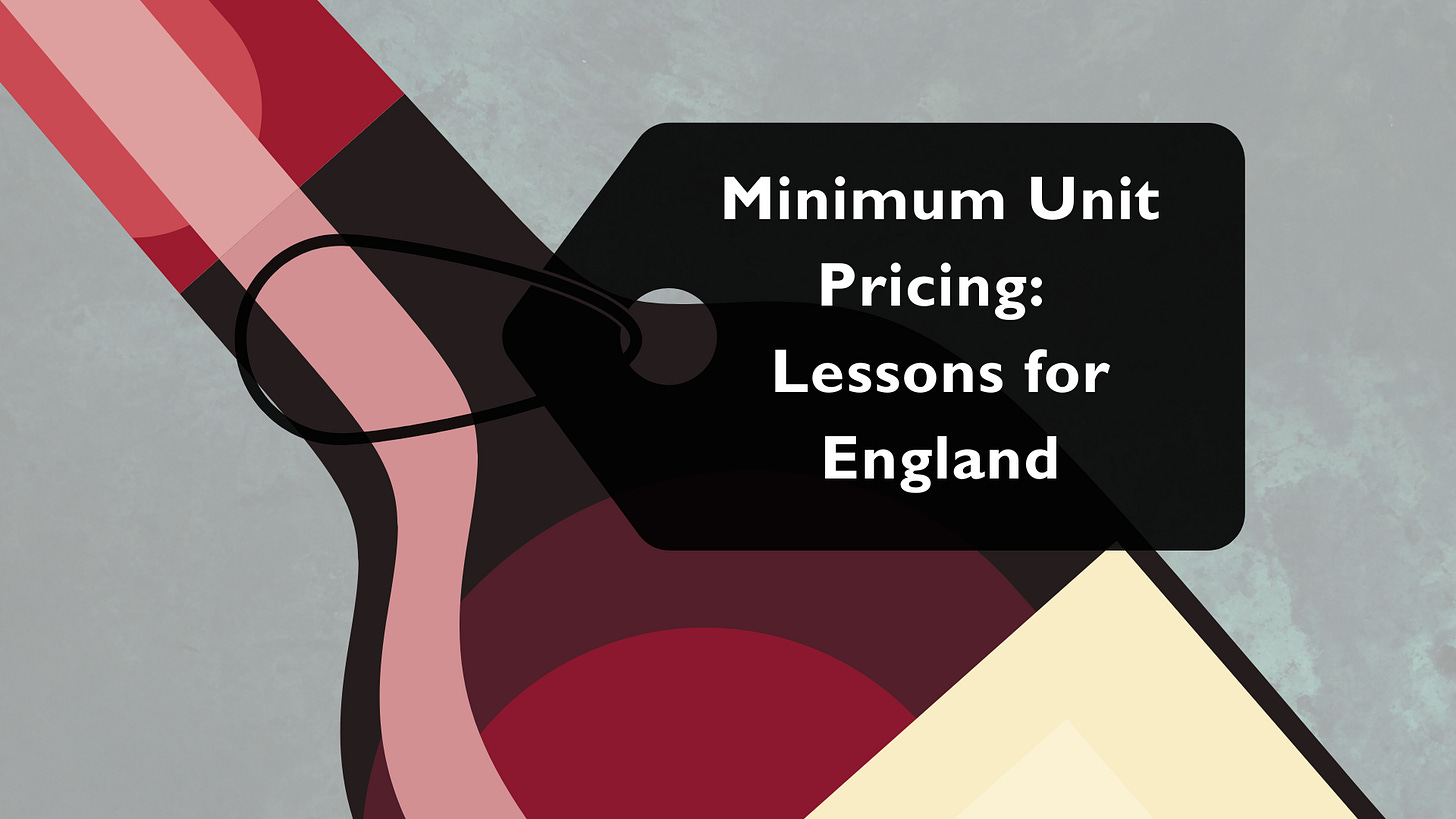
Join the Institute of Alcohol Studies for a webinar on Thursday 29 May at midday to learn everything you need to know about Minimum Unit Pricing (MUP) of alcohol.
Leading experts will explore the theory behind the policy, its impact in Scotland and Wales, and crucially, what England can learn from their experiences. The webinar will cover:
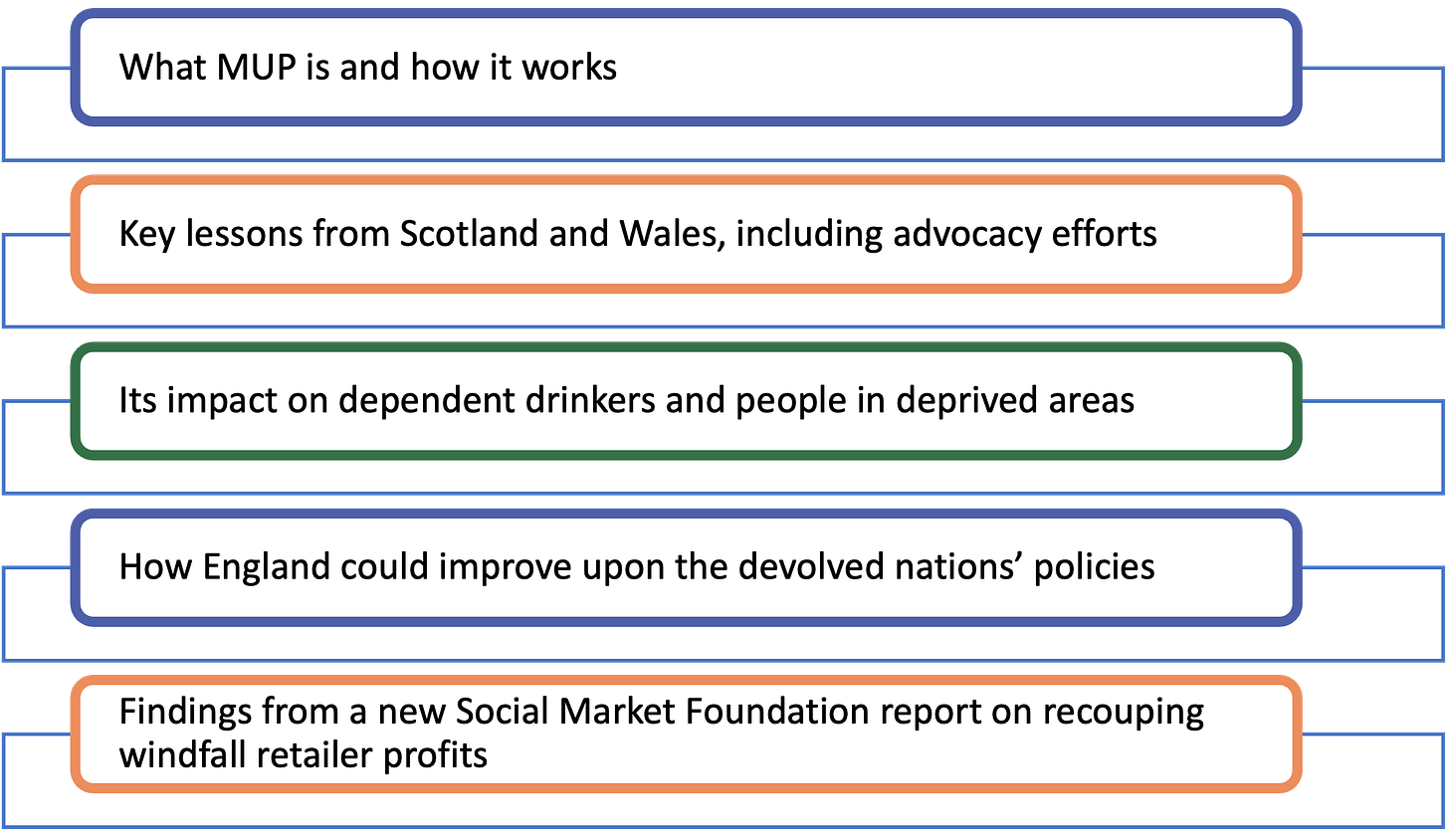
Click here to register for the event via Eventbrite.
What’s happened to the Health Mission?
When the Labour Party won the 2024 General Election, there was understandably cautious optimism among public health groups that prevention would be moved up the agenda. In many ways that has been vindicated, with the Tobacco and Vapes Bill forming a major part of the government’s health plans, as well as steps to tackle junk food advertising. On alcohol, things are much quieter, but a focus on the Health Mission would keep that cautious optimism afloat.
In a piece in the Health Service Journal, Sarah Woolnough, CEO of The King’s Fund, asks if the Health Mission has “gone missing”, since we’ve barely heard anything about it since the election, and that bolder goals could be missed by too much focus on NHS services.
Woolnough says that buried in the Labour manifesto was the line “Labour will tackle the social determinants of health, halving the gap in healthy life expectancy between the richest and poorest regions in England” – which was an “extraordinary ambition for health”. However, to get back on track, she and her colleague David Buck argue that the government needs to do six things:
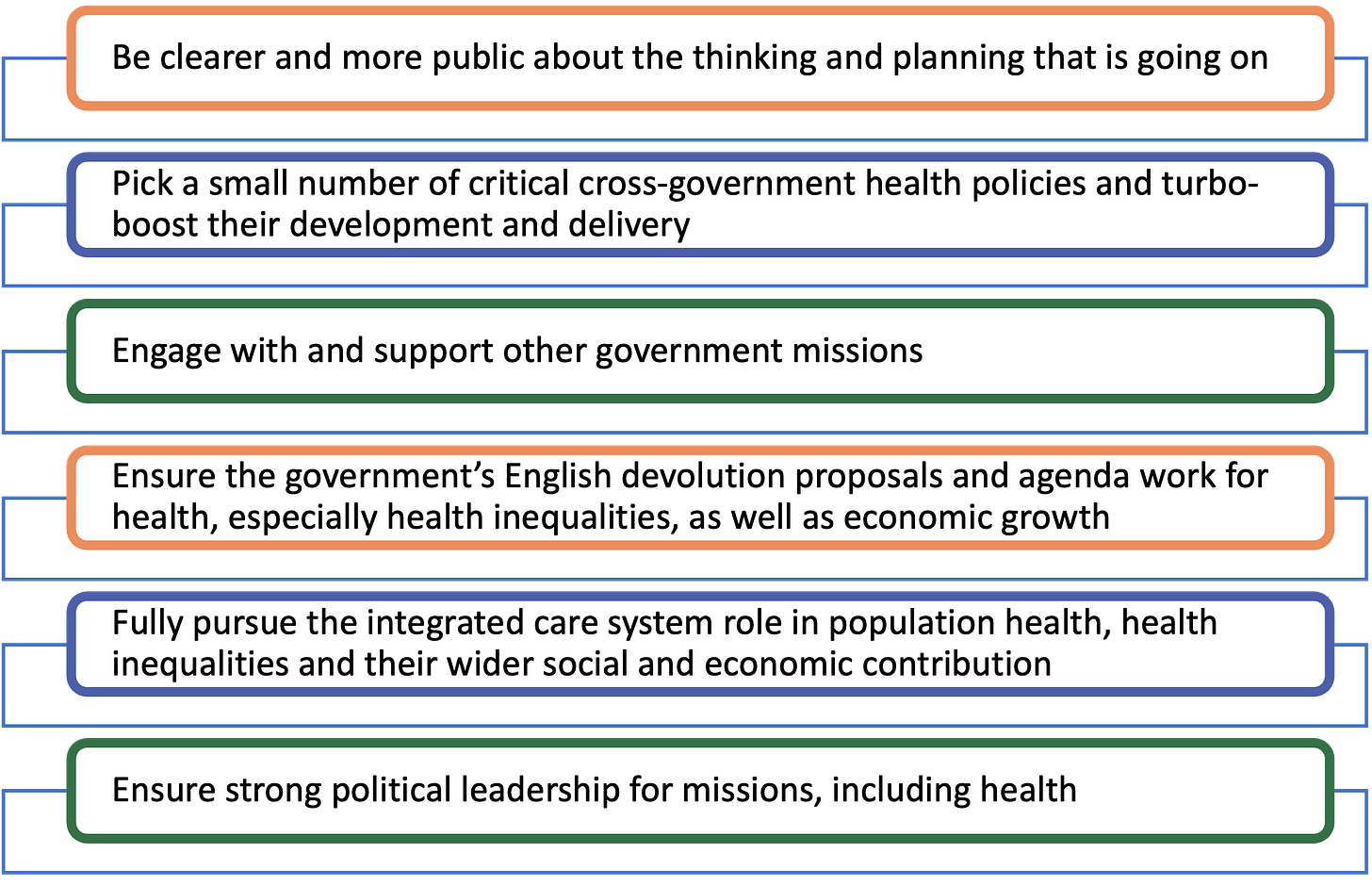
You can read the full article if you register for free to the HSJ.
In related news, the government is striking the right tone on prevention and reducing alcohol harm, but concrete action remains to be seen. In response to a Written Question on rising alcohol deaths, the new Public Health Minister Ashley Dalton stated that:
The Office for Health Improvement and Disparities (OHID) has an action plan to reduce drug and alcohol-related deaths, which is being reviewed in light of the recent Office for National Statistics data to ensure that it is grounded in the latest understanding of the drivers of drug and alcohol related deaths and responding to these.
However, there has been no detail on what that action plan may include, and responses to calls for an alcohol strategy remain vague, with DHSC promising to: “work across Government to better understand how we can best reduce alcohol-related harms”.
An impending alcohol trade war?
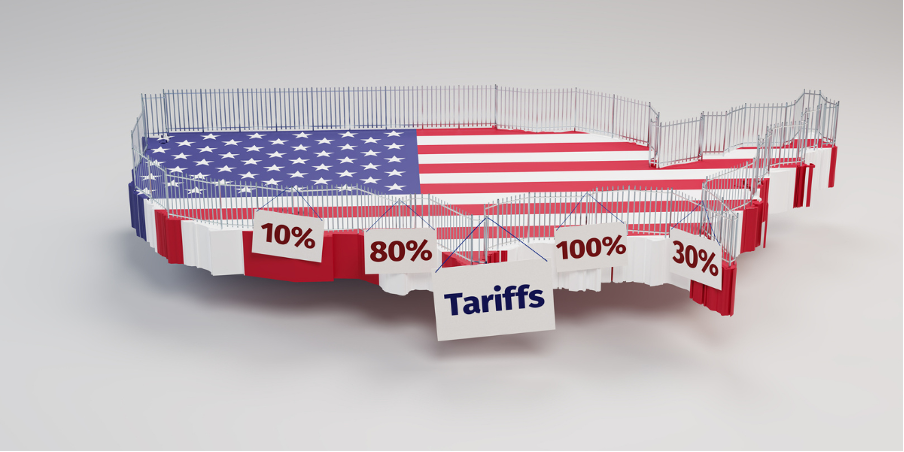
Cue falling into the trap of all news having to mention Donald Trump, the US President recently threatened to impose 200% tariffs on any alcohol coming into the country from the European Union (EU). This was in response to the EU planning to impose 50% tariffs on whisky produced in the US, which in turn was in retaliation for Trump’s tariffs on steel and aluminium.
A BBC article states that Europe sends more than £3.78 billion in wine alone to the US, with the secretary-general of the Comité Européen des Entreprises Vins saying that, if imposed, these tariffs would destroy the market and cost thousands of jobs. One champagne producer told ABC News that:
It means I’m in trouble, big trouble. We hope it’s just, as we say, blah blah. When someone speaks so loudly, it’s about the media buzz. But in any case, we think there will be consequences.
Diageo swiftly wrote a letter to the White House emphasising that the company supports 178,000 US jobs, and that protectionism was not required because trade in spirits was largely reciprocal.
Euronews stated that Trump’s threat to impose tariffs on European alcohol sent stocks in certain companies tumbling, such as Campari and Pernod Ricard. Wine and spirits companies are particularly reliant on US demand, whereas beer is less so.
The EU then announced that it would delay plans to introduce the tariffs on whisky, saying it wanted “additional time for discussions”. EU spokesperson Olof Gill said delaying until 13 April was “a slight adjustment to the timeline and does not diminish the impact of our response”.
Politico ran an interesting piece arguing that France’s “push for strategic autonomy crumbles under Trump’s booze tariffs”, due to them backtracking pretty quickly when their alcohol market was threatened.
But how could this affect alcohol consumption and harm?
Dr Norman Giesbrecht and Professor Tim Stockwell explore the potential consequences on both sides of the Atlantic of the proposed tariffs, in a blog for IAS.
They argue that in the US it could lead to a decrease in alcohol prices if alcohol exporters dump cheap products on local markets, which could increase harm. However, if it triggers a recession, a reduction in disposable income could reduce consumption.
Regarding the impact on the EU, they write that there could be initiatives to reduce the price of alcohol in order to sell the surplus within the EU, which again could increase harm.
However, they do caveat that these reflections “may be largely irrelevant as the fundamentals can change very quickly in this hostile and fluid climate”.
Weight-loss drugs could curb alcohol consumption
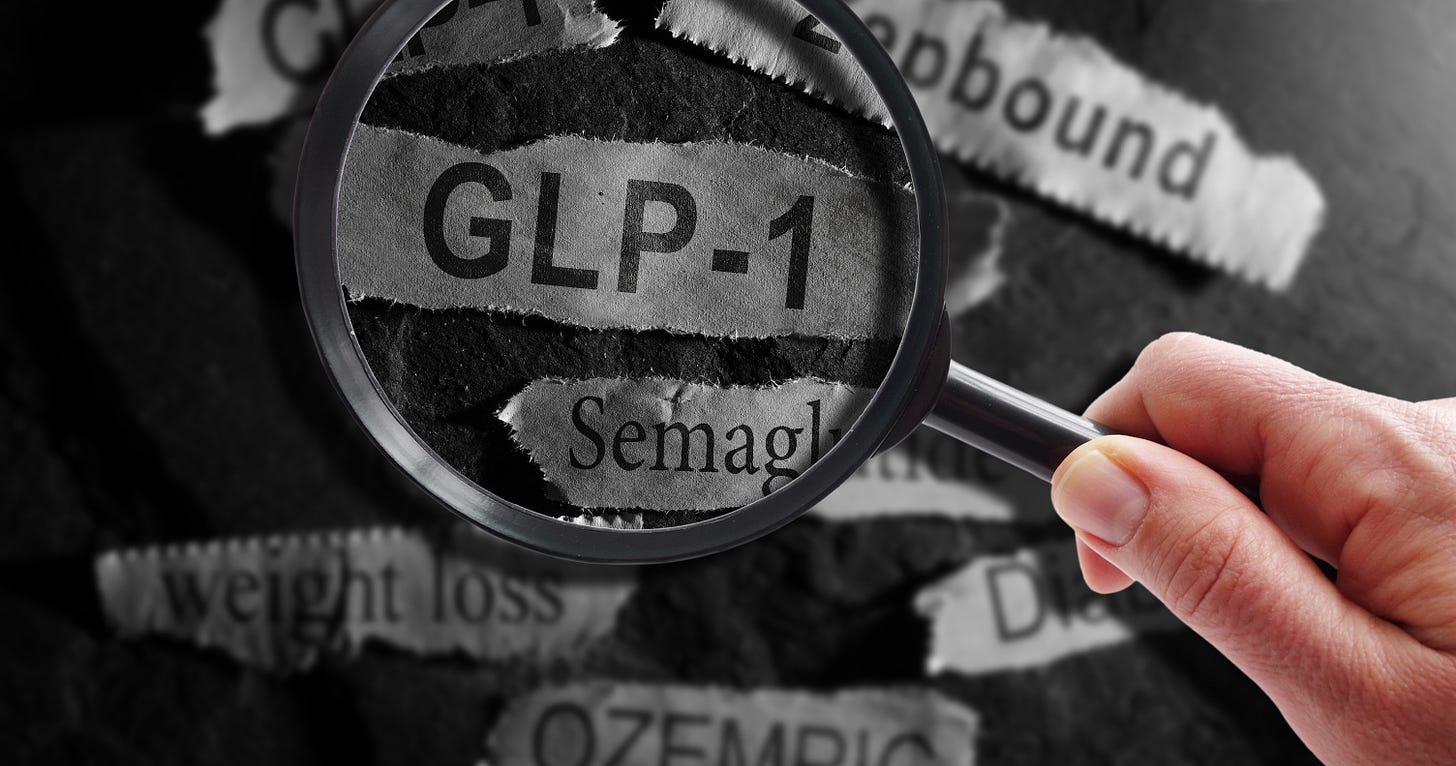
The weight-loss medication semaglutide, originally developed to manage obesity and diabetes, is now being explored for its potential to curb alcohol cravings and reduce consumption. Clinical trials and anecdotal evidence suggest that the drug, which acts on brain reward pathways, may help individuals with alcohol use disorder by diminishing urges for alcohol.
A recent study from the University of North Carolina found that semaglutide reduced the number of drinks consumed per day among participants by 41%. Professor Sir Ian Gilmore welcomed these developments, although he emphasised that:
While the evidence on the efficacy of these new drugs remains limited, we continue to urge the Government to focus on prevention, which will always be better, and cheaper, than a cure.
The rise of weight-loss drugs – such as the brands Ozempic, Wegovy, and Mounjaro – is apparently already being felt by the alcohol industry. Diageo has seen its share price dip, reportedly in part due to the impact of these medications. Investors, including fund manager Terry Smith, predict that these drugs will eventually be used to treat alcohol use disorders, further depressing alcohol sales.
In related news, Debra Crew, the president and CEO of Diageo, stated recently that moderation was the alcohol industry’s “biggest disrupter”, highlighting the industry’s current reliance on heavy alcohol consumption for profit-making.
Temporary takeaway alcohol system ends

During the pandemic, an Act was introduced to allow on-trade alcohol outlets to sell alcohol to takeaway and be consumed within an adjacent licensed pavement area.
The previous government launched a consultation on whether to keep the system and make it permanent, proposing three options for continuation. The majority of respondents ‘Disagreed’ or ‘Strongly disagreed’ with all three options, so the current government has announced that the measure will expire on 31 March.
Dame Diana Johnson, the Minister for Policing, Fire and Crime Prevention, stated that they were:
disappointed that there was not a consensus in favour of retaining an easement from which many pubs and pubgoers have benefited, and which supports our objectives both to promote the growth of the UK economy, and specifically to support the nation’s pub trade.
Therefore, they have amended guidance in the Licensing Act to advise licensing authorities that:
Where businesses have been benefiting from the current easement and wish to continue making off-sales beyond April 2025 – applications to amend a licence should be treated as minor variations.
The British Beer and Pub Association said it was disappointed with the decision, and there was:
no evidence that this easement created any widespread issues… we supported options that would have made the temporary easement permanent, so we are incredibly disappointed at the Government’s decision.
IAS responded to the original consultation, strongly disagreeing with the three proposals, arguing that all three would make the management of outdoor spaces at licensed premises significantly more difficult, and were likely to increase harm.
Debate on lifting football’s alcohol ban continues
Police Scotland has expressed openness to discussions with the Scottish Professional Football League (SPFL) about lifting the longstanding alcohol ban at football stadiums. The move would involve “a limited number of pilot projects” to test alcohol sales in concourses, with a focus on lower-risk games. This comes after documents released through a Freedom of Information request revealed internal discussions on the matter, including a briefing prepared for First Minister John Swinney in November.
However, First Minister Swinney said he was “not sympathetic” to lifting the ban, which has been in place for over 40 years following incidents of violence at the 1980 Scottish Cup Final. The ban permits alcohol sales in hospitality areas and fan zones but not general concourses. At a recent roundtable meeting, SPFL Chief Operating Officer Calum Beattie argued that lower-risk games could be used for alcohol sales trials, asserting that football fans should have the same rights as those attending other sports.
Despite this, Alcohol Focus Scotland (AFS) cautions that lifting the ban could exacerbate public health issues. Their report warns of potential increases in disorder, alcohol consumption, and the exposure of children to alcohol marketing, contradicting the Scottish Government’s aim to reduce alcohol availability.
In other Scottish news, recent figures from Public Health Scotland estimate that the number of Scots with chronic liver disease will rise from 43,200 in 2019 to 66,300 in 2044. Dr Alastair MacGilchrist, Chair of SHAAP, said:
Over 70% of this liver disease burden is due to alcohol, and these figures underline the severity of the public health emergency from alcohol that Scotland is facing, with the latest figures showing alcohol is directly responsible for 1,277 deaths annually.
Such an increase in liver disease is not inevitable. Public health measures to reduce alcohol consumption will help. Minimum unit pricing is already reducing the level of harm, but the Scottish Government needs to do more such as restrict alcohol marketing.
Across the Irish Sea – and sticking with the topic of alcohol marketing – the charity Alcohol Action Ireland (AAI) has launched a campaign called: “Time to Close the L0.0phole, Minister”. It asserts that advertising zero-alcohol versions of alcoholic drinks at sports events, on public transport, and near schools violates the spirit of existing laws aimed at reducing children’s exposure to alcohol marketing.
Sheila Gilheany, AAI’s chief executive, highlighted that during a recent Six Nations rugby match, the Guinness logo with “0.0” was prominently displayed on the pitch, potentially influencing young viewers who may not distinguish between alcoholic and non-alcoholic branding.
The Health Service Executive (HSE) is currently investigating alleged breaches related to the advertising of zero-alcohol products but notes that these products fall outside the current legal definition of an alcohol product.
New report highlights health and social benefits of reducing alcohol consumption
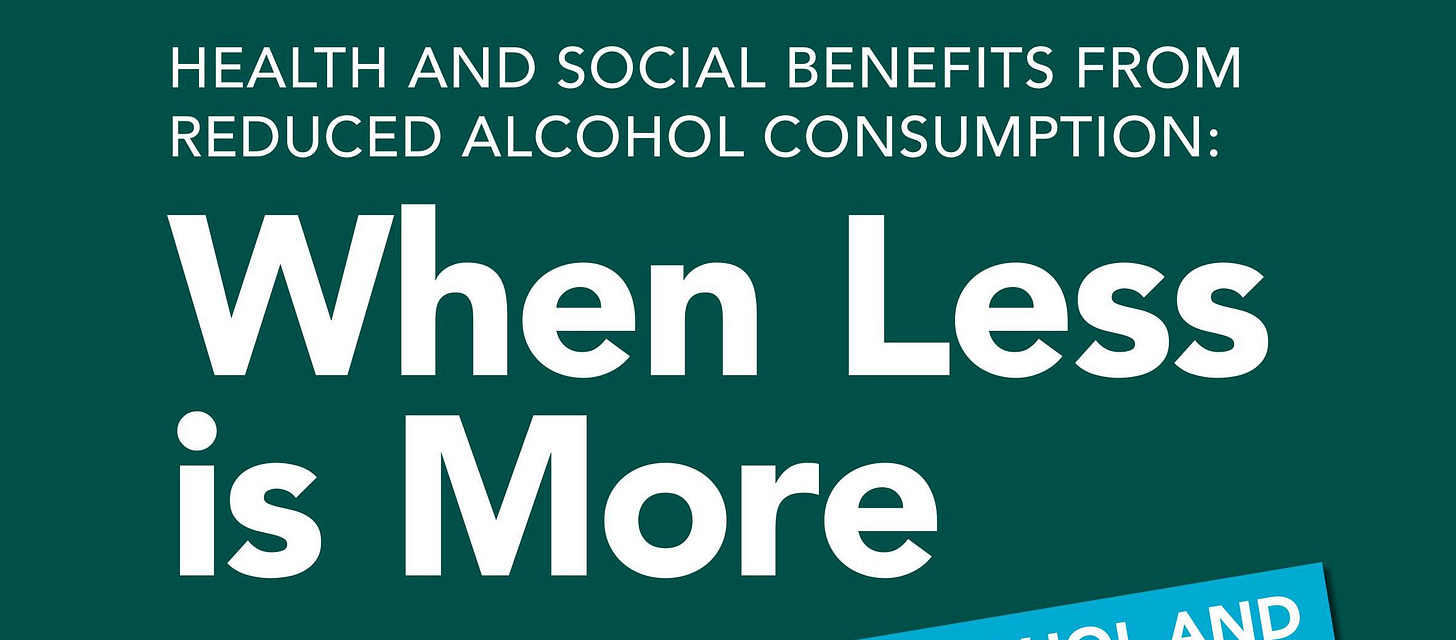
A group of alcohol experts, who publish a literature review each year, has launched a new report called ‘Health and Social Benefits from Reduced Alcohol Consumption: When Less is More’, which challenges the long-held belief that moderate alcohol consumption has health benefits. The study, conducted by leading international researchers, presents compelling evidence that reducing alcohol intake leads to significant health improvements, including lower risks of heart disease, stroke, cancer, and mental health disorders.
“The overwhelming conclusion from the past several decades of scientific literature is that ‘less is better than more,’” the report states. It highlights how policy measures such as higher alcohol taxes, restrictions on availability, and advertising bans are proven to reduce harm at a population level. Case studies from countries like Lithuania and Sweden demonstrate that tighter regulations lead to fewer alcohol-related deaths and hospitalisations.
With growing public interest in alcohol-free lifestyles, the report calls for stronger policy action, arguing that the global approach to alcohol regulation lags behind tobacco control.
With growing evidence of harms at even low levels of consumption and shrinking evidence of health benefits, more people are expressing interest in abstinence or reduced use.
Alcohol Toolkit Study: update
The monthly data collected is from English households and began in March 2014. Each month involves a new representative sample of approximately 1,700 adults aged 16 and over.
See more data on the project website here.
Prevalence of increasing and higher risk drinking (AUDIT-C)
Increasing and higher risk drinking defined as those scoring >4 AUDIT-C. A-C1: Professional to clerical occupation C2-E: Manual occupation
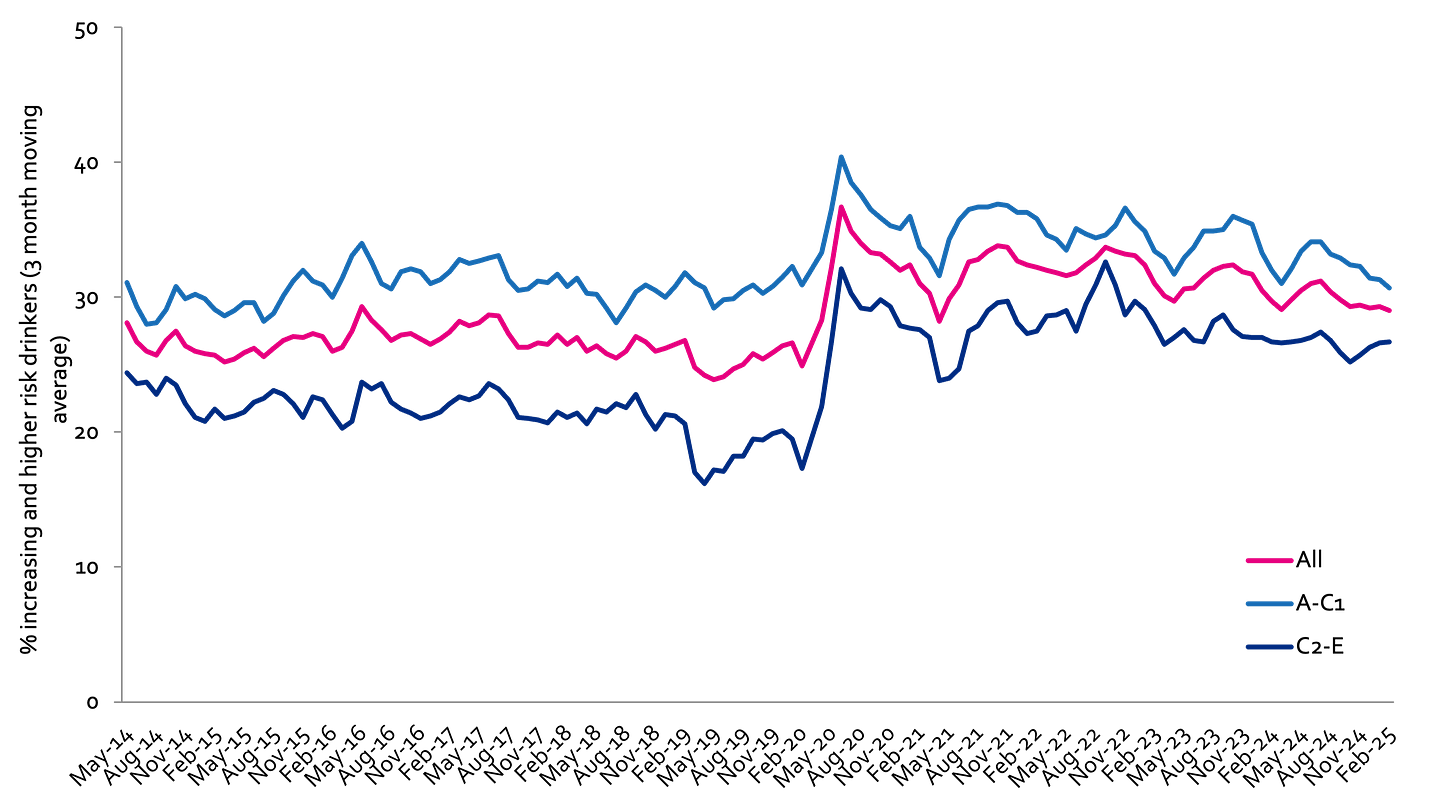
Currently trying to restrict consumption
A-C1: Professional to clerical occupation C2-E: Manual occupation; Question: Are you currently trying to restrict your alcohol consumption e.g. by drinking less, choosing lower strength alcohol or using smaller glasses? Are you currently trying to restrict your alcohol consumption e.g. by drinking less, choosing lower strength alcohol or using smaller glasses?
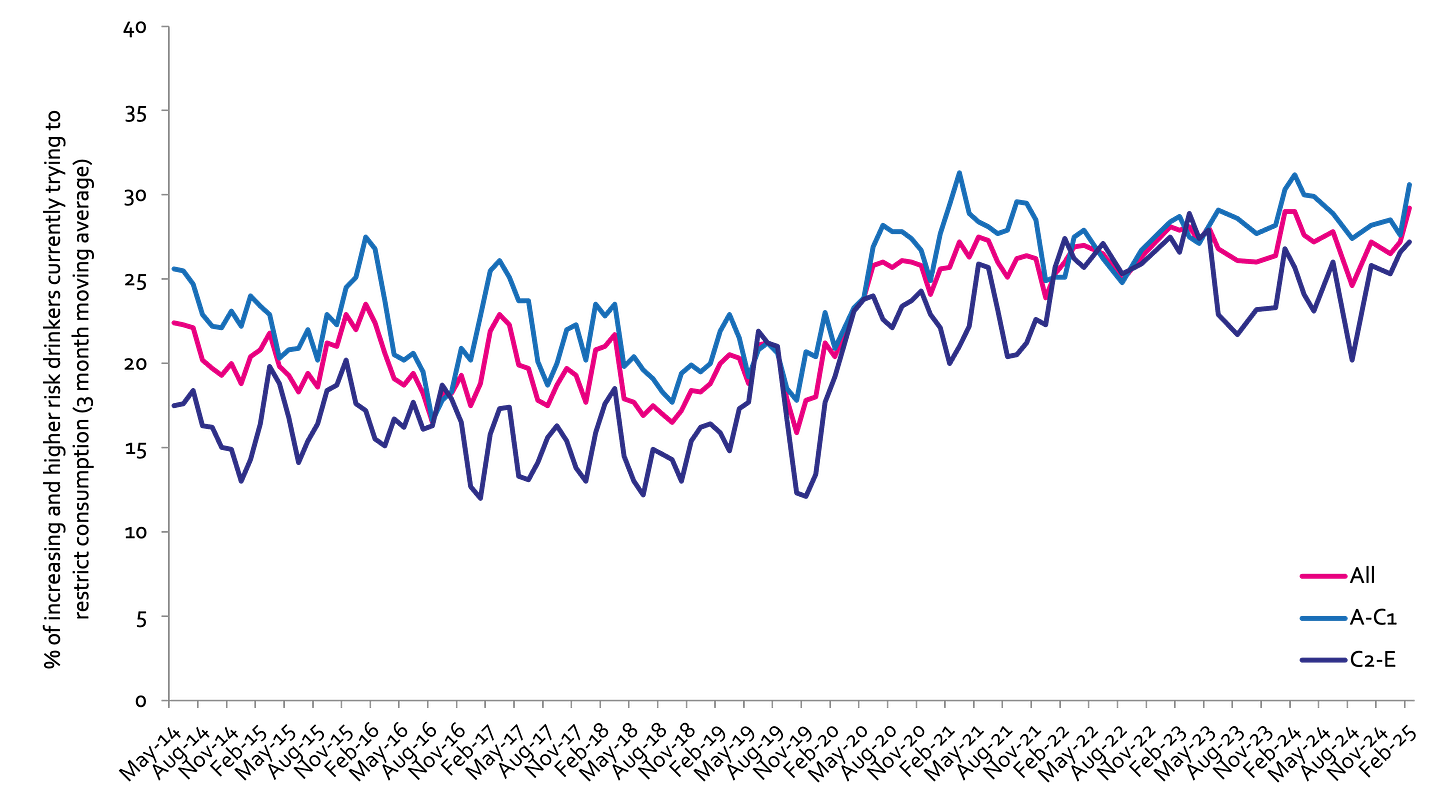
Serious past-year attempts to cut down or stop
Question 1: How many attempts to restrict your alcohol consumption have you made in the last 12 months (e.g. by drinking less, choosing lower strength alcohol or using smaller glasses)? Please include all attempts you have made in the last 12 months, whether or not they were successful, AND any attempt that you are currently making. Q2: During your most recent attempt to restrict your alcohol consumption, was it a serious attempt to cut down on your drinking permanently? A-C1: Professional to clerical occupation C2-E: Manual occupation
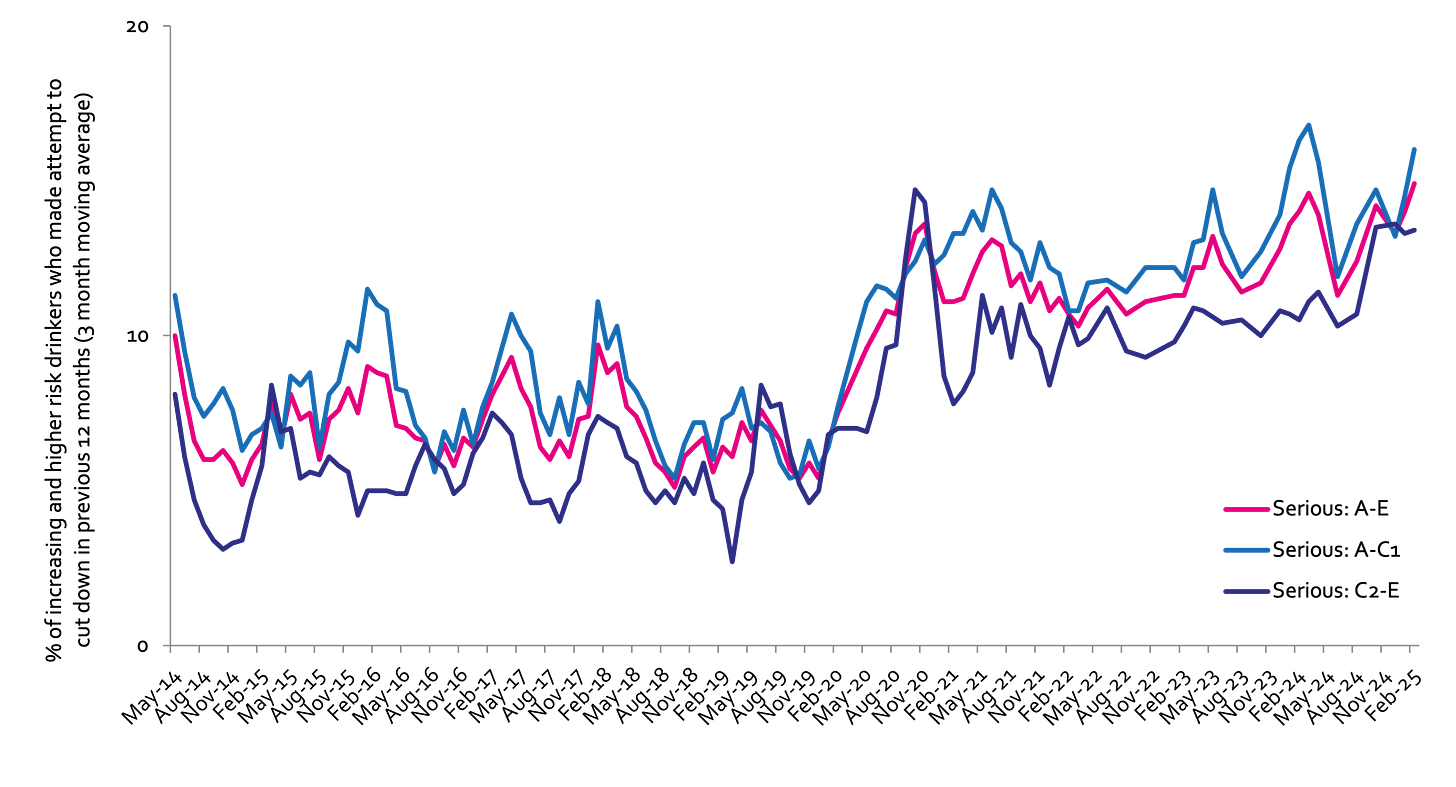
Podcast
Our monthly podcast features interviews with experts from across the sector.
How to shift the dial on alcohol policy in Europe
Florence Berteletti –
Eurocare
Anamaria Suciu –
Eurocare

